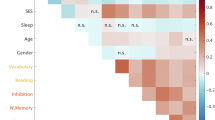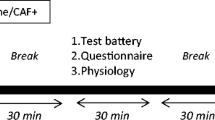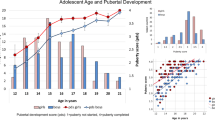Abstract
Previous studies have shown that caffeine can improve performance on cognitive tasks in adults, but little work has been done in children and adolescents, who use caffeine less habitually. The primary aim of this study was to test the hypothesis that acute caffeine enhances performance on cognitive tasks in children and adolescents. Two secondary aims were to determine if these effects differ as a function of sex, puberty, and menstrual cycle phase and if these effects can be attributed to withdrawal reversal. Children were given a cognitive test battery using the Automated Neurological Assessment Metrics (ANAM) before and 60 min after administration of placebo or caffeine (1 or 2 mg/kg). The number of correct responses and throughput on the Stroop task were increased after caffeine administration. Caffeine also decreased reaction time on the Stroop and decreased the standard deviation of the reaction time on the Go/No-Go task. We further analyzed these data based on presence or absence of withdrawal symptoms and by usual caffeine use and found that the effects of caffeine remained. We found interactions between sex and caffeine for Go/No-Go task time and the standard deviation of the reaction time on the Stroop task and an interaction between caffeine dose and menstrual cycle phase on the standard deviation of the reaction time on the Go/No-Go task. These results are consistent with previous studies showing caffeine facilitates performance on some cognitive tasks and that these improvements are not related to reversal of withdrawal effects. This study is among the first to report sex differences in responses to caffeine on cognitive tasks in children and adolescents.



Similar content being viewed by others
References
Arab, L., et al. (2011). Gender differences in tea, coffee, and cognitive decline in the elderly: the Cardiovascular Health Study. Journal of Alzheimer’s Disease, 27(3), 553–566.
Barone, J.J., Roberts, H., Human consumption of caffeine. Caffeine, ed. P.B. Dews. 1984: Springer Berlin Heidelberg.
Barry, R. J., et al. (2007). Caffeine effects on ERPs and performance in an auditory Go/NoGo task. Clinical Neurophysiology, 118(12), 2692–2699.
Bernstein, G. A., et al. (1998). Caffeine withdrawal in normal school-age children. Journal of the American Academy of Child & Adolescent Psychiatry, 37(8), 858–865.
Bonat, S., et al. (2002). Self-assessment of pubertal stage in overweight children. Pediatrics, 110(4), 743–747.
Botella, P., et al. (2001). Sex differences in estimation of time intervals and in reaction time are removed by moderate but not high doses of caffeine in coffee. Human Psychopharmacology, 16(7), 533–540.
Cernich, A., et al. (2007). Automated Neuropsychological Assessment Metrics sports medicine battery. Archives of Clinical Neuropsychol, 22(Suppl 1), S101–S114.
Clauson, K. A., et al. (2003). Safety issues associated with commercially available energy drinks. J Am Pharm Assoc, 48(3), e55–e63 2008.quiz e64–7.
Dixit, A., et al. (2012). Effect of caffeine on information processing: evidence from stroop task. Indian J Psychol Med, 34(3), 218–222.
Foxe, J. J., et al. (2012). Assessing the effects of caffeine and theanine on the maintenance of vigilance during a sustained attention task. Neuropharmacology, 62(7), 2320–2327.
Golden, C. J. (1974). Sex difference in performance on the Stroop color word test. Perception and Motor Skills, 39, 1067–1070.
Greden, J. F., Procter, A., & Victor, B. (1981). Caffeinism associated with greater use of other psychotropic agents. Comprehensive Psychiatry, 22(6), 565–571.
Griffiths, R. R., & Woodson, P. P. (1988). Caffeine physical dependence: a review of human and laboratory animal studies. Psychopharmacology, 94(4), 437–451.
Griffiths, R. R., et al. (1990). Low-dose caffeine physical dependence in humans. The Journal of Pharmacology and Experimental Therapeutics, 255(3), 1123–1132.
Harnack, L., Stang, J., & Story, M. (1999). Soft drink consumption among US children and adolescents: nutritional consequences. J Am Diet Assoc, 99(4), 436–441.
Heatherley, S. V., Hancock, K. M. F., & Rogers, P. J. (2006). Psychostimulant and other effects of caffeine in 9- to 11-year-old children. Journal of Child Psychology and Psychiatry, 47(2), 135–142.
Hewlett, P., & Smith, A. (2007). Effects of repeated doses of caffeine on performance and alertness: new data and secondary analyses. Human Psychopharmacology, 22(6), 339–350.
James, J. E., & Rogers, P. J. (2005). Effects of caffeine on performance and mood: withdrawal reversal is the most plausible explanation. Psychopharmacology, 182(1), 1–8.
Jarvis, M. J. (1993). Does caffeine intake enhance absolute levels of cognitive performance? Psychopharmacology, 110(1–2), 45.
Juliano, L. M., & Griffiths, R. R. (2004). A critical review of caffeine withdrawal: empirical validation of symptoms and signs, incidence, severity, and associated features. Psychopharmacology, 176(1), 1–29.
Juliano, L. M., et al. (2012). Development of the caffeine withdrawal symptom questionnaire: caffeine withdrawal symptoms cluster into 7 factors. Drug and Alcohol Dependence, 124(3), 229–234.
Kenemans, J. L., & Lorist, M. M. (1995). Caffeine and selective visual processing. Pharmacology, Biochemistry and Behavior, 52(3), 461–471.
Kenemans, J. L., et al. (1999). Caffeine and stroop interference. Pharmacology, Biochemistry, and Behavior, 63(4), 589–598.
Luebbe, A. M., & Bell, D. J. (2009). Mountain dew or mountain don’t?: a pilot investigation of caffeine use parameters and relations to depression and anxiety symptoms in 5th- and 10th-grade students. The Journal of School Health, 79(8), 380.
Marczinski, C. A., et al. (2014). Subjective state, blood pressure, and behavioral control changes produced by an “energy shot”. Journal Caffeine Research, 4(2), 57–63.
Miller, K. E. (2008). Wired: energy drinks, jock identity, masculine norms, and risk taking. Journal of American College Health, 56(5), 481–489.
Mucignat-Caretta, C. (1998). Changes in female cognitive performance after energetic drink consumption: a preliminary study. Progress in Neuro-Psychopharmacology & Biological Psychiatry, 22(6), 1035–1042.
Nawrot, P., et al. (2003). Effects of caffeine on human health. Food Additives and Contaminants, 20(1), 1–30.
Nehlig, A. (2010). Is caffeine a cognitive enhancer? Journal of Alzheimer’s Disease, 20(Suppl 1), S85–S94.
Pesta, B. J., Bertsch, S., Poznanski, P. J., & Bommer, W. H. (2008). Sex differences on elementary cognitive tasks despite no differences on the Wonderlic Personality Test. Personality and Individual Differences, 45, 429–431.
Rees, K., Allen, D., & Lader, M. (1999). The influences of age and caffeine on psychomotor and cognitive function. Psychopharmacology, 145(2), 181–188.
Richardson, N. J., et al. (1995). Mood and performance effects of caffeine in relation to acute and chronic caffeine deprivation. Pharmacology, Biochemistry, and Behavior, 52(2), 313–320.
Richardson, N. J., Rogers, P. J., & Elliman, N. A. (1996). Conditioned flavour preferences reinforced by caffeine consumed after lunch. Physiology & Behavior, 60(1), 257–263.
Rogers, P., et al. (2005). Effects of caffeine and caffeine withdrawal on mood and cognitive performance degraded by sleep restriction. Psychopharmacology, 179(4), 742–752.
Rogers, P., et al. (2013). Faster but not smarter: effects of caffeine and caffeine withdrawal on alertness and performance. Psychopharmacology, 226(2), 229–240.
Schlossberger, N. M., Turner, R. A., & Irwin Jr., C. E. (1992). Validity of self-report of pubertal maturation in early adolescents. The Journal of Adolescent Health, 13(2), 109–113.
Smit, H. J., & Rogers, P. J. (2000). Effects of low doses of caffeine on cognitive performance, mood and thirst in low and higher caffeine consumers. Psychopharmacology, 152(2), 167–173.
Smith, A. (2002). Effects of caffeine on human behavior. Food and Chemical Toxicology, 40(9), 1243–1255.
Smith, A., et al. (1994). Effects of breakfast and caffeine on cognitive performance, mood and cardiovascular functioning. Appetite, 22(1), 39–55.
Smith, A. P., Christopher, G., & Sutherland, D. (2013). Acute effects of caffeine on attention: a comparison of non-consumers and withdrawn consumers. Journal of Psychopharmacology, 27(1), 77–83.
Temple, J. L., & Ziegler, A. M. (2011). Gender differences in subjective and physiological responses to caffeine and the role of steroid hormones. Journal of Caffeine Research, 1, 41–48.
Temple, J. L., et al. (2009). Sex differences in reinforcing value of caffeinated beverages in adolescents. Behavioural Pharmacology, 20(8), 731–741.
Temple, J. L., et al. (2012). Influence of caffeine on the liking of novel-flavored soda in adolescents. Psychopharmacology, 223(1), 37–45.
Temple, J. L., et al. (2014). Cardiovascular responses to caffeine by gender and pubertal stage. Pediatrics, 134(1), e112–e119.
Temple, J. L., et al. (2015). Subjective responses to caffeine are influenced by caffeine dose, sex, and pubertal stage. Journal Caffeine Research, 5(4), 167–175.
Warburton, D. M. (1995). Effects of caffeine on cognition and mood without caffeine abstinence. Psychopharmacology, 119(1), 66.
Funding
The authors thank our funding sources, including R01 DA030386 to JLT and a fellowship from the University at Buffalo Gender Institute to AMG.
Author information
Authors and Affiliations
Corresponding author
Ethics declarations
The study protocol was approved by the Social and Behavioral Sciences Institutional Review Board at The University at Buffalo.
Conflict of Interest
The authors declare that they have no conflict of interest.
Rights and permissions
About this article
Cite this article
Graczyk, A.M., Ziegler, A.M., Bendlin, A. et al. Effects of Caffeine Administration on Reaction Time, Attention, and Inhibitory Control in Children and Adolescents. J Cogn Enhanc 2, 276–286 (2018). https://doi.org/10.1007/s41465-018-0074-3
Received:
Accepted:
Published:
Issue Date:
DOI: https://doi.org/10.1007/s41465-018-0074-3




